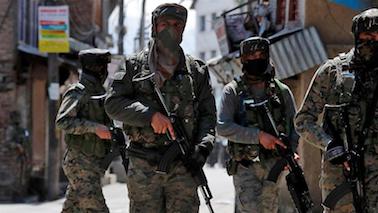Federal administration in disputed region ends requirement by forces to obtain a special certificate for acquiring land.
The Indian administration of Jammu and Kashmir has lifted a requirement set in place by a 1971 circular under which Indian security forces had to obtain a special certificate in order to acquire land in the disputed region.
The order allows Indian Army, Border Security Forces, paramilitary forces and similar organisations to acquire land without a no objection certificate (NOC) clearance from the region`s home department, according to a report by the Anadolu Agency on Tuesday.
The order cites the extension of the 2013 Right to Fair Compensation and Transparency in Land Acquisition, Rehabilitation and Resettlement Act to the Jammu and Kashmir region after it was declared a federal territory in a controversial move by the Indian government in August last year.
In view of the federal law`s extension, the circular requiring an NOC from the erstwhile state`s home department prior to acquisition or requisition of land by the security forces was withdrawn, according to the order.
The move came on the heels of the regional administration agreeing to legal changes to allow construction in the region`s strategic areas by the Indian armed forces.
Scrapped Autonomy
On 5 August last year, India revoked Article 370 and related constitutional provisions, effectively scrapping the partial autonomy that Muslim-majority Jammu and Kashmir state had, splitting it into two federally administered territories, Jammu and Kashmir, and Ladakh.
At the same time, New Delhi imposed a crippling security lockdown, detaining thousands, imposing restrictions on movement and enforcing a communications blackout.
In May this year, India passed a law allowing people from outside Kashmir to become permanent residents of the territory, sparking fears of a demographic change and non-locals getting priority in housing, jobs and education.
Khurram Pervez, a prominent human rights activist based in Srinagar, noted that residents of slums in Jammu and Kashmir are entitled to affordable housing, and that the domicile law could make tens of thousands of migrant labourers from other Indian states eligible for public housing as well.
According to a census conducted in 2011, Muslims comprised 68.31 percent and Hindus 28.43 percent of the 12.5 million people in the erstwhile Jammu and Kashmir state.
Since 18 May, more than 25,000 people have been granted domicile certificates, including refugees from Pakistan, Gurkha soldiers from Nepal who had served in the Indian army and marginalised groups such as sanitation workers from the State of Punjab.
Our distinct social and cultural identity, whether it`s our languages or traditions - everything is in danger, Haroon Reshi, a freelance journalist based in the main city of Srinagar, told Reuters news agency.
In another move, which officials said would generate jobs and boost development, the Indian administration on 24 July approved setting aside 488 hectares (1,205 acres) of state land to build industrial estates in about 35 locations across the region.
Raja Muzaffar Bhat, chairman of the J&K RTI Movement, an anti-corruption charity, described the decision as disastrous in a statement on Monday, saying the government should instead focus on establishing more agricultural land and creating green jobs.
The Himalayan region of Kashmir is held by India and Pakistan in part, but claimed by both in full. A small sliver of the region is also controlled by China.
Since India and Pakistan were partitioned in 1947, the two nuclear-armed neighbours have fought three wars--in 1948, 1965, and 1971--two of them over Kashmir.
Some Kashmiri groups have been fighting against Indian rule for independence or unification with Pakistan.
According to several human rights groups, thousands of people have been killed in the conflict since 1989.
Photo: India`s Central Reserve Police Force (CRPF) personnel leave after a gun battle with rebels in Srinagar on 19 May 2020. Source: Danish Ismail/Reuters.














